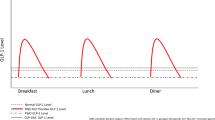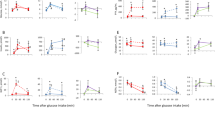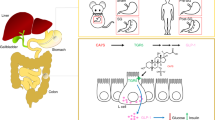Abstract
Despite increasing understanding of the changes in gastrointestinal and central neuroendocrine signaling following gastric bypass surgery (GBP) in morbidly obese patients, the mechanisms underlying weight loss and weight loss maintenance are not completely understood. Changes in energy expenditure are increasingly recognized as an important factor contributing to weight loss and metabolic effects in patients following GBP surgery. Experimental data regarding changes in energy balance following metabolic surgery in animal models suggest increased energy expenditure postoperatively as an important factor in the process of weight loss. However, the underlying neuroendocrine mechanisms are not well understood, and data regarding changes in energy expenditure in humans after GBP are inconsistent because of heterogenic patient populations and variable techniques. Nevertheless, a growing body of knowledge and understanding of the complex entero–neurohumoral interaction with its consequences in appetite, satiety and energy expenditure will help reveal the mechanisms of weight loss and weight loss maintenance following GBP surgery. Here we review how gastrointestinal hormones potentially regulate energy balance, and summarize current available experimental and clinical data on energy expenditure following obesity surgery.
This is a preview of subscription content, access via your institution
Access options
Subscribe to this journal
Receive 12 print issues and online access
$259.00 per year
only $21.58 per issue
Buy this article
- Purchase on Springer Link
- Instant access to full article PDF
Prices may be subject to local taxes which are calculated during checkout
Similar content being viewed by others
References
Visscher TL, Seidell JC . The public health impact of obesity. Annu Rev Public Health 2001; 22: 355–375.
Allison DB, Saunders SE . Obesity in North America. An overview. Med Clin North Am 2000; 84: 305–332, v.
Hedley AA, Ogden CL, Johnson CL, Carroll MD, Curtin LR, Flegal KM . Prevalence of overweight and obesity among US children, adolescents, and adults, 1999–2002. JAMA 2004; 291: 2847–2850.
Kaplan LM . Pharmacological therapies for obesity. Gastroenterol Clin North Am 2005; 34: 91–104.
Adams TD, Gress RE, Smith SC, Halverson RC, Simper SC, Rosamond WD et al. Long-term mortality after gastric bypass surgery. N Engl J Med 2007; 357: 753–761.
Sjostrom L, Narbro K, Sjostrom CD, Karason K, Larsson B, Wedel H et al. Effects of bariatric surgery on mortality in Swedish obese subjects. N Engl J Med 2007; 357: 741–752.
Buchwald H, Oien DM . Metabolic/bariatric surgery Worldwide 2008. Obes Surg 2009; 19: 1605–1611.
Greenway FL . Surgery for obesity. Endocrinol Metab Clin North Am 1996; 25: 1005–1027.
Borg CM, le Roux CW, Ghatei MA, Bloom SR, Patel AG, Aylwin SJ . Progressive rise in gut hormone levels after Roux-en-Y gastric bypass suggests gut adaptation and explains altered satiety. Br J Surg 2006; 93: 210–215.
Burge JC, Schaumburg JZ, Choban PS, DiSilvestro RA, Flancbaum L . Changes in patients’ taste acuity after Roux-en-Y gastric bypass for clinically severe obesity. J Am Diet Assoc 1995; 95: 666–670.
Scruggs DM, Buffington C, Cowan Jr GS . Taste acuity of the morbidly obese before and after gastric bypass surgery. Obes Surg 1994; 4: 24–28.
Tichansky DS, Boughter Jr JD, Madan AK . Taste change after laparoscopic Roux-en-Y gastric bypass and laparoscopic adjustable gastric banding. Surg Obes Relat Dis 2006; 2: 440–444.
Olbers T, Bjorkman S, Lindroos A, Maleckas A, Lonn L, Sjostrom L et al. Body composition, dietary intake, and energy expenditure after laparoscopic Roux-en-Y gastric bypass and laparoscopic vertical banded gastroplasty: a randomized clinical trial. Ann Surg 2006; 244: 715–722.
Korner J, Bessler M, Cirilo LJ, Conwell IM, Daud A, Restuccia NL et al. Effects of Roux-en-Y gastric bypass surgery on fasting and postprandial concentrations of plasma ghrelin, peptide YY, and insulin. J Clin Endocrinol Metab 2005; 90: 359–365.
le Roux CW, Aylwin SJ, Batterham RL, Borg CM, Coyle F, Prasad V et al. Gut hormone profiles following bariatric surgery favor an anorectic state, facilitate weight loss, and improve metabolic parameters. Ann Surg 2006; 243: 108–114.
le Roux CW, Welbourn R, Werling M, Osborne A, Kokkinos A, Laurenius A et al. Gut hormones as mediators of appetite and weight loss after Roux-en-Y gastric bypass. Ann Surg 2007; 246: 780–785.
Murphy KG, Bloom SR . Gut hormones and the regulation of energy homeostasis. Nature 2006; 444: 854–859.
Cone RD, Cowley MA, Butler AA, Fan W, Marks DL, Low MJ . The arcuate nucleus as a conduit for diverse signals relevant to energy homeostasis. Int J Obes Relat Metab Disord 2001; 25 (Suppl 5): S63–S67.
Schwartz MW, Woods SC, Porte Jr D, Seeley RJ, Baskin DG . Central nervous system control of food intake. Nature 2000; 404: 661–671.
Balasubramaniam A, Mullins DE, Lin S, Zhai W, Tao Z, Dhawan VC et al. Neuropeptide Y (NPY) Y4 receptor selective agonists based on NPY(32-36): development of an anorectic Y4 receptor selective agonist with picomolar affinity. J Med Chem 2006; 49: 2661–2665.
Larsen PJ, Kristensen P . The neuropeptide Y (Y4) receptor is highly expressed in neurones of the rat dorsal vagal complex. Brain Res Mol Brain Res 1997; 48: 1–6.
Batterham RL, Cowley MA, Small CJ, Herzog H, Cohen MA, Dakin CL et al. Gut hormone PYY(3-36) physiologically inhibits food intake. Nature 2002; 418: 650–654.
Batterham RL, Cohen MA, Ellis SM, le Roux CW, Withers DJ, Frost GS et al. Inhibition of food intake in obese subjects by peptide YY3-36. N Engl J Med 2003; 349: 941–948.
Badman MK, Flier JS . The gut and energy balance: visceral allies in the obesity wars. Science 2005; 307: 1909–1914.
Guo Y, Ma L, Enriori PJ, Koska J, Franks PW, Brookshire T et al. Physiological evidence for the involvement of peptide YY in the regulation of energy homeostasis in humans. Obesity (Silver Spring) 2006; 14: 1562–1570.
Doucet E, Laviolette M, Imbeault P, Strychar I, Rabasa-Lhoret R, Prud’homme D . Total peptide YY is a correlate of postprandial energy expenditure but not of appetite or energy intake in healthy women. Metabolism 2008; 57: 1458–1464.
Adams SH, Lei C, Jodka CM, Nikoulina SE, Hoyt JA, Gedulin B et al. PYY[3-36] administration decreases the respiratory quotient and reduces adiposity in diet-induced obese mice. J Nutr 2006; 136: 195–201.
Dakin CL, Small CJ, Park AJ, Seth A, Ghatei MA, Bloom SR . Repeated ICV administration of oxyntomodulin causes a greater reduction in body weight gain than in pair-fed rats. Am J Physiol Endocrinol Metab 2002; 283: E1173–E1177.
Sowden GL, Drucker DJ, Weinshenker D, Swoap SJ . Oxyntomodulin increases intrinsic heart rate in mice independent of the glucagon-like peptide-1 receptor. Am J Physiol Regul Integr Comp Physiol 2007; 292: R962–R970.
Wynne K, Park AJ, Small CJ, Patterson M, Ellis SM, Murphy KG et al. Subcutaneous oxyntomodulin reduces body weight in overweight and obese subjects: a double-blind, randomized, controlled trial. Diabetes 2005; 54: 2390–2395.
Asakawa A, Inui A, Yuzuriha H, Ueno N, Katsuura G, Fujimiya M et al. Characterization of the effects of pancreatic polypeptide in the regulation of energy balance. Gastroenterology 2003; 124: 1325–1336.
Lutz TA . Amylinergic control of food intake. Physiol Behav 2006; 89: 465–471.
Osto M, Wielinga PY, Alder B, Walser N, Lutz TA . Modulation of the satiating effect of amylin by central ghrelin, leptin and insulin. Physiol Behav 2007; 91: 566–572.
Cummings DE, Weigle DS, Frayo RS, Breen PA, Ma MK, Dellinger EP et al. Plasma ghrelin levels after diet-induced weight loss or gastric bypass surgery. N Engl J Med 2002; 346: 1623–1630.
Bueter M, Lowenstein C, Olbers T, Wang M, Cluny NL, Bloom SR et al. Gastric bypass increases energy expenditure in rats. Gastroenterology 2010; 138: 1845–1853.
Bueter M, Lowenstein C, Ashrafian H, Hillebrand J, Bloom SR, Olbers T et al. Vagal sparing surgical technique but not stoma size affects body weight loss in rodent model of gastric bypass. Obes Surg 2010; 20: 616–622.
Nadreau E, Baraboi ED, Samson P, Blouin A, Hould FS, Marceau P et al. Effects of the biliopancreatic diversion on energy balance in the rat. Int J Obes (Lond) 2006; 30: 419–429.
le Roux CW, Borg C, Wallis K, Vincent RP, Bueter M, Goodlad R et al. Gut hypertrophy after gastric bypass is associated with increased glucagon-like peptide 2 and intestinal crypt cell proliferation. Ann Surg 2010; 252: 50–56.
Furnes MW, Tommeras K, Arum CJ, Zhao CM, Chen D . Gastric bypass surgery causes body weight loss without reducing food intake in rats. Obes Surg 2008; 18: 415–422.
Guijarro A, Suzuki S, Chen C, Kirchner H, Middleton FA, Nadtochiy S et al. Characterization of weight loss and weight regain mechanisms after Roux-en-Y gastric bypass in rats. Am J Physiol Regul Integr Comp Physiol 2007; 293: R1474–R1489.
Stylopoulos N, Hoppin AG, Kaplan LM . Roux-en-Y gastric bypass enhances energy expenditure and extends lifespan in diet-induced obese rats. Obesity (Silver Spring) 2009; 17: 1839–1847.
Shibata H, Bukowiecki LJ . Regulatory alterations of daily energy expenditure induced by fasting or overfeeding in unrestrained rats. J Appl Physiol 1987; 63: 465–470.
Flier JS . Clinical review 94: what's in a name? In search of leptin's physiologic role. J Clin Endocrinol Metab 1998; 83: 1407–1413.
Shin AC, Zheng H, Townsend RL, Sigalet DL, Berthoud HR . Meal-induced hormone responses in a rat model of Roux-en-Y gastric bypass surgery. Endocrinology 2010; 151: 1588–1597.
Batterham RL, Heffron H, Kapoor S, Chivers JE, Chandarana K, Herzog H et al. Critical role for peptide YY in protein-mediated satiation and body-weight regulation. Cell Metab 2006; 4: 223–233.
de Castro Cesar M, de Lima Montebelo MI, Rasera Jr I, de Oliveira Jr AV, Gomes Gonelli PR, Aparecida Cardoso G . Effects of Roux-en-Y gastric bypass on resting energy expenditure in women. Obes Surg 2008; 18: 1376–1380.
Carrasco F, Papapietro K, Csendes A, Salazar G, Echenique C, Lisboa C et al. Changes in resting energy expenditure and body composition after weight loss following Roux-en-Y gastric bypass. Obes Surg 2007; 17: 608–616.
Das SK, Roberts SB, McCrory MA, Hsu LK, Shikora SA, Kehayias JJ et al. Long-term changes in energy expenditure and body composition after massive weight loss induced by gastric bypass surgery. Am J Clin Nutr 2003; 78: 22–30.
Flancbaum L, Choban PS, Bradley LR, Burge JC . Changes in measured resting energy expenditure after Roux-en-Y gastric bypass for clinically severe obesity. Surgery 1997; 122: 943–949.
Apfelbaum M, Bostsarron J, Lacatis D . Effect of caloric restriction and excessive caloric intake on energy expenditure. Am J Clin Nutr 1971; 24: 1405–1409.
Jequier E, Schutz Y . Long-term measurements of energy expenditure in humans using a respiration chamber. Am J Clin Nutr 1983; 38: 989–998.
Justino SR, Dias MC, Maculevicius J, Colugnati FA, Sing TC, Halpern A et al. Basal energy expenditure and diet- induced modifications to thermogenesis in short bowel syndrome. Clin Nutr 2005; 24: 38–46.
Luz J, Griggio MA, Fagundes DJ, Araujo RM, Marcondes W . Oxygen consumption of rats with broad intestinal resection. Braz J Med Biol Res 2000; 33: 1497–1500.
Stefater MA, Perez-Tilve D, Chambers AP, Wilson-Perez HE, Sandoval DA, Berger J et al. Sleeve gastrectomy induces loss of weight and fat mass in obese rats, but does not affect leptin sensitivity. Gastroenterology 2010; 138: 2426–2436.
Murray ME, Franks G, Gazet J, Grundy A . Radiologic demonstration of small bowel adaptation following modified scopinaro procedure for morbid obesity. Obes Surg 1993; 3: 165–168.
Author information
Authors and Affiliations
Corresponding author
Ethics declarations
Competing interests
CW le Roux has received consulting fees from Ethicon and Allergan. He has also received grant support from Ethicon and National Institute of Health Research. M Bueter declares no conflict of interest.
Rights and permissions
About this article
Cite this article
Bueter, M., le Roux, C. Gastrointestinal hormones, energy balance and bariatric surgery. Int J Obes 35 (Suppl 3), S35–S39 (2011). https://doi.org/10.1038/ijo.2011.146
Published:
Issue Date:
DOI: https://doi.org/10.1038/ijo.2011.146
Keywords
This article is cited by
-
Resolution of NASH and hepatic fibrosis by the GLP-1R and GCGR dual-agonist cotadutide via modulating mitochondrial function and lipogenesis
Nature Metabolism (2020)
-
Impact of Duodenal-Jejunal Exclusion on Satiety Hormones
Obesity Surgery (2016)
-
Mechanisms of Weight Loss, Diabetes Control and Changes in Food Choices After Gastrointestinal Surgery
Current Atherosclerosis Reports (2012)
-
Roux-en-Y Gastric Bypass in Mice—Surgical Technique and Characterisation
Obesity Surgery (2012)



